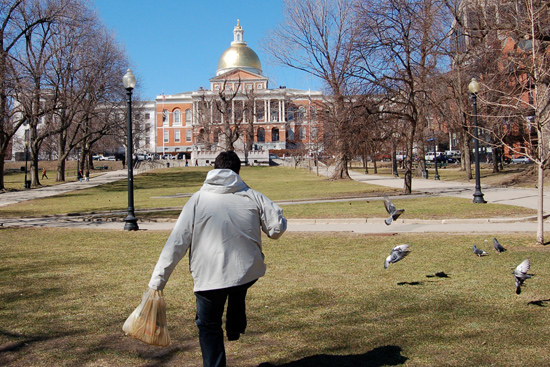Welcome to Boston: Don’t Scare the Pigeons
Antique laws remain on historic Massachusetts books

Leave our feathered friends alone: an old Massachusetts law against scaring pigeons remains on the books. Photo by Flickr contributor Jason Macor
Welcome to Boston, America’s number one college town. And now, a few words of advice: don’t have sex—unless you’re married. “Fornication”—sex, even consensual, between unmarried people, even adults—has been against the law in Massachusetts since 1692, and doing it can get you up to three months in the slammer.
Of course, you’re unlikely to be prosecuted, and not just because today’s morals are very different from those of 1692 (they put suspected witches on trial back then as well). A 1994 Massachusetts court ruling in a housing case mentioned in passing that the fornication ban “is of doubtful constitutionality, at least as applied to the private, consensual conduct of persons over the age of consent.” Two state lawmakers, one of them Senator Cynthia Stone Creem (SMG’64, LAW’66) (D-Newton), sought last year to repeal several such antiquated laws. And failed.
Almost four centuries as a colony and then a commonwealth have saddled Massachusetts with many laws addressing situations that may not pertain to modern life. Creem’s main concern last year was more serious than fornication: she disagrees with 19th-century state laws prohibiting abortion and fears they might come into play if the US Supreme Court ever curtailed its 1973 decision allowing abortion.
But while that issue remains a live debate today, many other statutes that the senator sought to kill seem downright weird. Among them is a 1963 ban on cursing at sporting events, punishable by a $50 fine (which might bankrupt Red Sox fans during the current underwhelming season). Another prohibits blasphemy—infidels who disrespect the name of God, Jesus Christ, or the Holy Spirit face a maximum of a year in jail and $300 fine.
Meanwhile, publicly mangling “The Star-Spangled Banner” by dancing to it or including it in a music medley remains punishable by a $100 fine. (If only Roseanne Barr had performed her famous botch of the song here.) Nor are you allowed to join a subversive organization, according to a 1951 law passed during the McCarthy-era Communism phobia. Spitting on the sidewalk could garner a $20 fine. And since 1848, anyone who frightens pigeons has risked up to a month in prison and a $20 fine. The same penalty can befall people who kill the birds while trying to catch them in nets.
How do such moldy legislative leftovers avoid the garbage can?
“Laws are passed often to address something very specific. And then people forget about it,” especially if the laws aren’t enforced, says Fred Bayles (COM’72), a College of Communication associate journalism professor, on sabbatical from directing BU’s Statehouse Program for student journalists. He says that students in his program often stumble across these antiques of law, which remind Bayles of the final scene in Raiders of the Lost Ark, when the biblical relic is mothballed in a cavernous warehouse filled with other items. An antiquated law “is the new lost artifact,” he says.
Adultery laws, for example, survive into modern times; Bayles once worked as a reporter in Vermont, which didn’t decriminalize marital infidelity until the 1980s. He recalls researching the history of a prison there, and says that “about 30 percent of the inmates, at least in the early 19th century, were there for adultery.” Vermonters remained indifferent to the law’s existence for so long partly because it wasn’t enforced, and partly out of a political concern about repeal, Bayles says. After all, “Who wants to be in favor of adultery?”
Certainly not Massachusetts, which still deems it a crime, courtesy of a 1762 law that can bring up to three years’ jail time. Creem last year attributed the failure of her repeal effort to lawmakers’ fear of appearing indifferent to ethics. “It seems as though there hasn’t been any appetite to do anything about this,” she told the Boston Globe last year. “Some of my colleagues fear they’ll offend people by going after these laws, because many of them deal with morality.”
Yet one expert says we should go easy on our ancestors, as sometimes today’s goofy laws were yesterday’s valid concerns. Massachusetts Historical Society librarian Peter Drummey says the prohibition about frightening pigeons actually made sense in the 19th century, when the birds were both a food source for residents and used in target shooting.
“People were not allowed to scare pigeons about to alight on someone else’s trap or net—a sort of hunter-trapper protection law” rather than a pigeon-rights measure, Drummey says. “Modern wildlife protection laws probably make this old law redundant or obsolete, but Massachusetts has more recent laws that prohibit animal rights activists or others from interfering with or obstructing hunters.”
In short, he says, hunter protection laws similar to our forebears’.
Comments & Discussion
Boston University moderates comments to facilitate an informed, substantive, civil conversation. Abusive, profane, self-promotional, misleading, incoherent or off-topic comments will be rejected. Moderators are staffed during regular business hours (EST) and can only accept comments written in English. Statistics or facts must include a citation or a link to the citation.